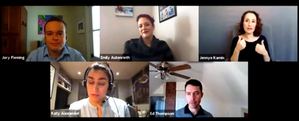 During Winter Institute 16 last weekend, Emily Autenrieth, owner of A Seat at the Table Books in Elk Grove, Calif., led a discussion on neurodiversity and how bookstores can be more inclusive to both neurodiverse staff members and customers. On the panel were Katy Alexander, global director of marketing and communications for Digital Science; Jory Fleming, author of How to Be Human: An Autistic Man's Guide to Life; and Ed Thompson, CEO of Uptimize.
During Winter Institute 16 last weekend, Emily Autenrieth, owner of A Seat at the Table Books in Elk Grove, Calif., led a discussion on neurodiversity and how bookstores can be more inclusive to both neurodiverse staff members and customers. On the panel were Katy Alexander, global director of marketing and communications for Digital Science; Jory Fleming, author of How to Be Human: An Autistic Man's Guide to Life; and Ed Thompson, CEO of Uptimize.
Thompson, who founded a company that helps other organizations recruit and retain neurodiverse talent, explained that broadly speaking, the term simply recognizes the "natural diversity of the human brain," though he acknowledged that there are "obviously less common thinking styles and traits."
 Whether someone is neurodivergent/neurodistinct or not, he continued, everybody has different communication preferences, and he advised any organization to do a "communication audit," which involves simply asking team members how they prefer to communicate. He noted, too, that not everyone who is neurodistinct will be willing to disclose that information, and some neurodistinct people aren't aware of it themselves.
Whether someone is neurodivergent/neurodistinct or not, he continued, everybody has different communication preferences, and he advised any organization to do a "communication audit," which involves simply asking team members how they prefer to communicate. He noted, too, that not everyone who is neurodistinct will be willing to disclose that information, and some neurodistinct people aren't aware of it themselves.
Alexander discussed her experience with dyslexia, saying that for her, the most important thing is coming up with coping mechanisms and making sure they are in place "as early on as possible." Organizing can be a real challenge, and though she emphasized the point that no single solution will work for everyone with dyslexia, she did recommend using a journal to stay organized or online tools like Trello or Monday. The use of dyslexic-friendly fonts can make a big difference without requiring much effort, and openness among team members is a major asset. With the teams that she manages, she tries to create an environment where no employee would have a problem telling her that the instructions she gave were unclear or asking for some space apart from the rest of the group.
Fleming likened having autism to having a "different operating system" from most people, with a different user interface and a different way of doing things. He said having autism has affected his life in a lot of ways, some of them positive and some negative. On the subject of neurotypical people worrying they'll say the wrong thing or ask the wrong question, Fleming reported that he doesn't always mind questions, but it all comes down to "framing and intention." If the questions come from a good place, if they come from good intentions, he always welcomes conversations about autism.
When it comes to work environments, he said he welcomes flexibility with regard to interfacing with colleagues. As an example he mentioned that coworkers sometimes like to go to bars together after work, but bars can be a major "sensory overload" for him, so being able to turn down those opportunities without worrying that his coworkers will hold it against him is major.
On the subject of making bookstores more inclusive, Alexander suggested carrying some books that have dyslexic-friendly fonts, and when it comes to children's books, don't group them by age. For a 10-year-old child with dyslexia, it can be discouraging and humiliating to go to the 10-year-old section and find that you struggle to read any of the books there. Fleming added that small bookstores can be very comforting when it comes to sensory input and noted that bookstores can carry titles that introduce people to the concept of neurodiversity and build displays around things like Dyslexia Awareness Month.
Autenrieth pointed out that sometimes customers will ask booksellers to recommend titles for a niece or nephew with autism, and the panelists agreed that the best response is to try to guide the conversation toward that child's interests and favorite books, as one would with a recommendation for any child. --Alex Mutter

